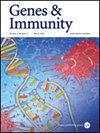用于有效抗癌免疫疗法的新抗原特异性 mRNA/DC 疫苗。
IF 4.5
3区 医学
Q1 GENETICS & HEREDITY
引用次数: 0
摘要
开发基于新抗原的个性化抗癌疫苗是癌症免疫疗法的一个新方向。树突状细胞(DC)肿瘤疫苗构建的最新进展是用编码新抗原的 mRNA 负载 DC,这种方法可以快速生产并适合个性化制备。细胞穿透肽(CPPs)是一种新兴的生物递送系统,带负电荷的核酸可缠绕在阳离子 CPP 骨架上形成纳米级复合物。这种制备方法有利于标准化。如果 DC 能高水平表达和呈现新抗原 mRNA,那么它将具有广阔的应用前景。在本研究中,我们利用小鼠结肠癌(MC38)的候选新抗原开发了一种新抗原-mRNA/DC 疫苗,并考察了其免疫和抗肿瘤效果。结果表明,新抗原-mRNA/DC 疫苗能诱导强烈的 T 细胞免疫反应,并表现出显著的抗肿瘤效果,有效阻止肿瘤生长。我们的研究为进一步优化 DC 疫苗的制备和降低成本提供了实验基础。本文章由计算机程序翻译,如有差异,请以英文原文为准。

Neoantigen-specific mRNA/DC vaccines for effective anticancer immunotherapy
The development of personalized anticancer vaccines based on neoantigens represents a new direction in cancer immunotherapy. The latest advancement in dendritic cell (DC) tumor vaccine construction involves loading DC with mRNA-encoding neoantigens, which allows for rapid production and is suitable for personalized preparation. Cell-penetrating peptides (CPPs) are emerging as biological delivery systems in which negatively charged nucleic acids can be wound onto the cationic CPP backbone to form nanoscale complexes. This preparation method facilitates standardization. If DC can express and present neoantigen mRNA at high levels, it holds promising application potential. In this study, we developed a neoantigen-mRNA/DC vaccine using candidate neoantigens from mouse colon cancer (MC38) and examined its immune and antitumor effects. The results demonstrated that neoantigen-mRNA/DC vaccines induced strong T cell immune responses and exhibited significant antitumor effects, effectively preventing tumor growth. Our study provides an experimental basis for further optimizing the preparation of DC vaccines and reducing their costs.
求助全文
通过发布文献求助,成功后即可免费获取论文全文。
去求助
来源期刊

Genes and immunity
医学-免疫学
CiteScore
8.90
自引率
4.00%
发文量
28
审稿时长
6-12 weeks
期刊介绍:
Genes & Immunity emphasizes studies investigating how genetic, genomic and functional variations affect immune cells and the immune system, and associated processes in the regulation of health and disease. It further highlights articles on the transcriptional and posttranslational control of gene products involved in signaling pathways regulating immune cells, and protective and destructive immune responses.
 求助内容:
求助内容: 应助结果提醒方式:
应助结果提醒方式:


